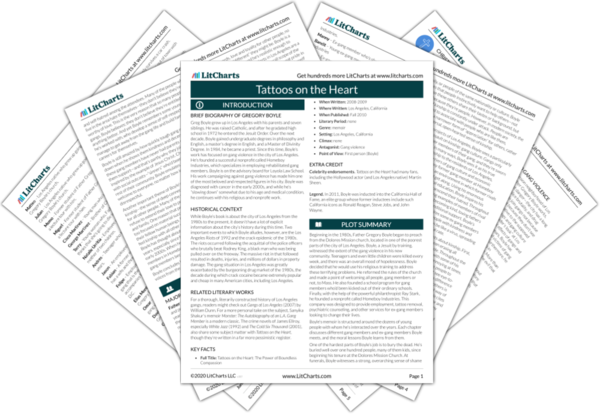In the Dolores Mission neighborhood of Los Angeles where Father Gregory Boyle works, violence is a constant danger—the city has a long history of racial discrimination, police brutality, and drug trafficking. Boyle argues that people join gangs not because they’re inherently violent people, but because they don’t see themselves as having any good alternative to the supposed security and emotional support that gangs and gang culture provide. While Boyle doesn’t give an “insider’s look” at Los Angeles gangs, he writes about the horrific effects of gangs and gang violence on his community. Over the years, Boyle has organized the funerals of almost two hundred victims of gang violence, many of them no older than fifteen. Furthermore, he describes the overall mood of despair that exists in communities dominated by the threat of violence. More than anything else, it could be argued, gang violence is the evil that Boyle has tried to defeat over his career.
One of the most important points that Boyle makes about gangs is that they’re conditional in their love, and therefore they are the opposite of the unconditional Christian love that Boyle stands for. Gangs provide a network of support, both emotional and financial, for impoverished Los Angeles residents. However, this support comes with some strings attached: if the gang members don’t abide by the rules, obey their superiors, or commit crimes when ordered, they’ll be horribly punished. It’s no wonder, Boyle writes, that gang members live in a more or less constant state of fear—they’re terrified not only of other gangs, who might be trying to kill them, but also of their own “friends.” Embedded in hierarchical and violent gang culture, many of the people in Boyle’s community struggle to show or respond to compassion. They’re so used to being hurt and threatened that the concept of someone being unconditionally kind to them is utterly and tragically foreign. Boyle suggests that it is largely because of the overall mood of fear and despair—not just the concrete economic motives—that people continue to commit crimes in the Dolores Mission.
At times, Boyle can be exceptionally harsh in his analysis of gang violence and the culture that surrounds gang violence. When writing about teen pregnancies in the Dolores Mission, he argues that young women choose to become mothers out of wedlock—“before they’re ready”—because they think they’re going to die soon, and want to “accelerate the whole process.” Boyle’s observation—which implies that young, impoverished women are deliberately having children they know they won’t be able to support—evokes the political rhetoric of “blaming the victims”; in other words, suggesting that impoverished people in Dolores are primarily responsible for their own suffering. At the same time, however, Boyle maintains that the residents of the Dolores Mission are fundamentally good people who have been hurt and misled by the influence of gang violence. In his religious teaching and his nonprofit work, Boyle hopes to undo some of the harmful influences of gang violence and tap into people’s potential for goodness.
Gangs and Gang Violence ThemeTracker

Gangs and Gang Violence Quotes in Tattoos on the Heart
Homeboy Industries can only hire and help a finite number of gang members. Though thousands have found assistance, it remains a tiny drop in a pretty deep bucket. In the city of Los Angeles, Homeboy Industries has operated as a symbol as much as a place of concrete help. For more than twenty years, it has asked this city "What if we were to invest in gang members, rather than just seek to incarcerate our way out of this problem?"
I'm thinking, How does a sixteen-year-old get off thinking that she won't see eighteen? It is one of the explanations for teen pregnancies in the barrio. If you don't believe you will reach eighteen, then you accelerate the whole process, and you become a mother well before you're ready.
"Damn, G, seventy-five?" He shakes his head in disbelief, his voice a bare hush now. "I mean, damn . . . when's it gonna end?"
I reach down to Omar and go to shake his hand. We connect and I pull him to his feet. I hold his hand with both of mine and zero in on his eyes.
"Mijo, it will end," I say, "the minute . . . you decide."
"For the first time in the history of this country three gang members walked into the White House. We had dinner there . . . I told her the food tasted nasty."
He pauses and gets still. And she cried.
I get still myself.
Well, mijo, whaddya 'spect? She just caught a glimpse of ya. She saw that you are somebody. She recognized you . . . as the shape of God's heart. Sometimes people cry when they see that.
But who wouldn't be proud to claim Chico as their own?
His soul feeling its worth before its leaving.
The mortician's incredulity reminds me that kinship remains elusive. Its absence asserts that any effort to help someone like Chico just might be a waste of our collective time.
















